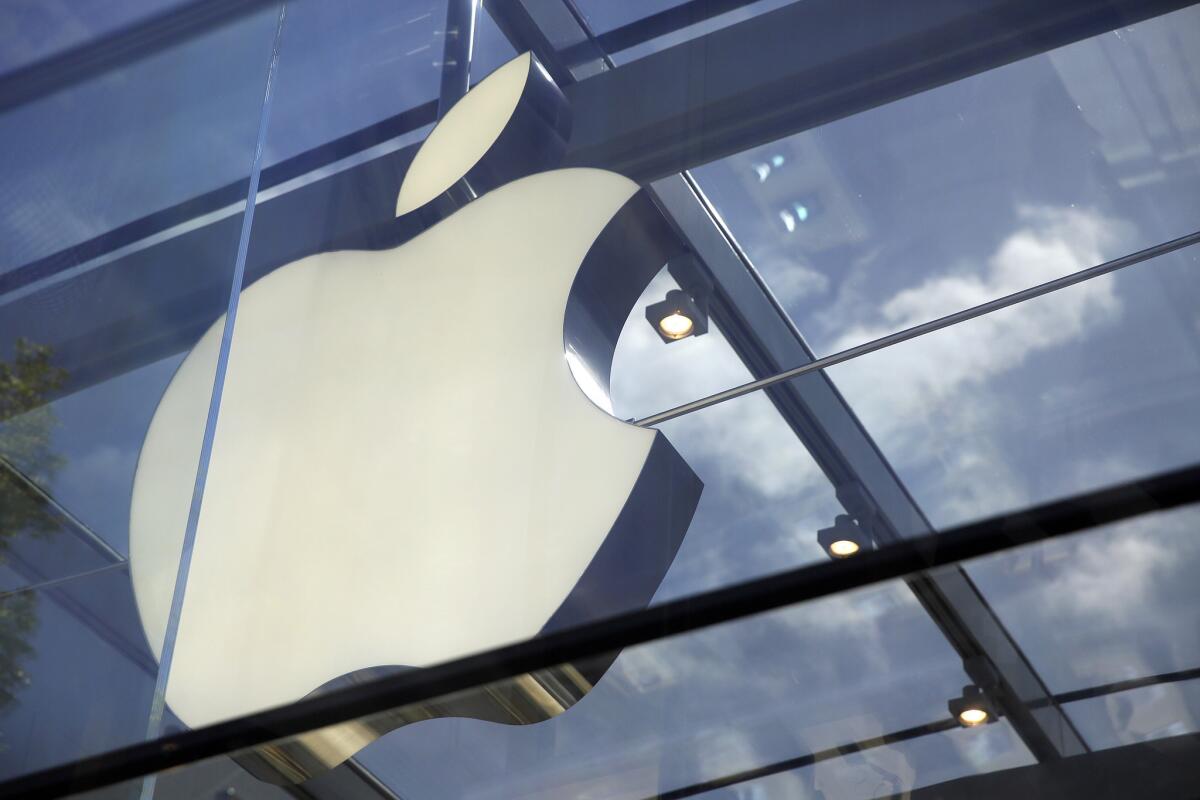Apple could report first quarterly revenue drop in 13 years

The Apple logo is seen on an Apple Store in Palo Alto, Calif.
- Share via
The last time Apple Inc. announced a quarterly sales decline, Steve Jobs was celebrating the laptop going mainstream.
Thirteen years later, falling interest in the iPhone is expected to bring Apple’s first year-over-year revenue drop since then when it reports earnings Tuesday. Estimates say Apple generated $2 in earnings per share and $52 billion in revenue during the first quarter, which would mark a 10% decline from a year earlier, according to a survey of 47 analysts by research firm FactSet.
Apple has become so big — delivering the largest profits ever among the world’s publicly traded companies — that the huge revenue bumps of recent years have become difficult to replicate. Those spikes were largely attributed to the runaway success of the iPhone, which accounts for about two-thirds of Apple’s sales and profit.
The company says there are still people out there who want and can afford new $700 iPhones. But its outlook has been met with an outpouring of skepticism.
For instance, Deutsche Bank analyst Sherri Scribner is concerned that Apple won’t be able to get price-conscious buyers in India and China to take up the iPhone fast enough to make up for the slowing number of Americans and Western Europeans buying new iPhones.
A month ago, Apple began selling the iPhone SE for as low as $400 to widen its potential customer base. But the device, smaller than last year’s new iPhone but still robust feature-wise, remains out of the price range for many.
More than 70% of smartphones sold in China cost less than $300. In India, 80% are below $150. Neither statistic augurs well for Apple, whose smartphones sell at a huge premium.
Analysts on average expect Apple to sell 217 million iPhones in the 12-month period that ends Sept. 30. That would mark a 6% decline from last year — in line with the 7% drop predicted across the smartphone industry in 2016. Annual smartphone sales growth has never before dipped into the single digits, research firm Gartner said.
Apple Chief Executive Tim Cook forecast in January an iPhone sales decline for the quarter, though he refused to offer predictions for the rest of the year.
Some experts are now worried that Cook will say Tuesday that sales for the April-through-June quarter will be more underwhelming than expected. The evidence includes reports that Apple’s suppliers have stuck to reduced production cycles, suggesting that there’s no big sales uptick in sight.
“This overall market is slowing,” Ryan Reith, IDC’s mobility research director, said of smartphones. “Apple has had ridiculous growth where they have outpaced the market and that has to change at some point.”
Apple’s top rival among smartphone brands fared relatively better in the first quarter than it did. Samsung Electronics Co. previewed first-quarter earnings last week, saying they would top those of last year by about 10%, with revenue likely to rise about 4%.
But Samsung is coming off a bad year. Production miscues and unpopular design changes undercut sales of the Galaxy S6, which debuted during last year’s second quarter. By contrast, the Galaxy S7 went on sale in mid-March, pulling the initial sales rush into the company’s first-quarter results.
The concerns about Apple are already affecting its stock. Shares endured a 3% hit last week, but investors are mostly holding on — even though the company hasn’t outlined when and how it can return to robust growth.
“With valuation currently reflecting long-term growth challenges … we view shares as fairly valued and maintain our hold,” Scribner told clients last week.
Investors who continued to back Apple after the last quarterly sales dip — 1% in April 2003 — did well. Shares surged from less than $2 to more than $100 by 2014, giving Apple the crown of the world’s most valuable company by market capitalization.
The earnings announcement, originally scheduled for Monday, moved to Tuesday so that Apple employees could attend a memorial service for Bill Campbell. The former Apple marketing executive and board member died a week ago at 75.
paresh.dave@latimes.com




